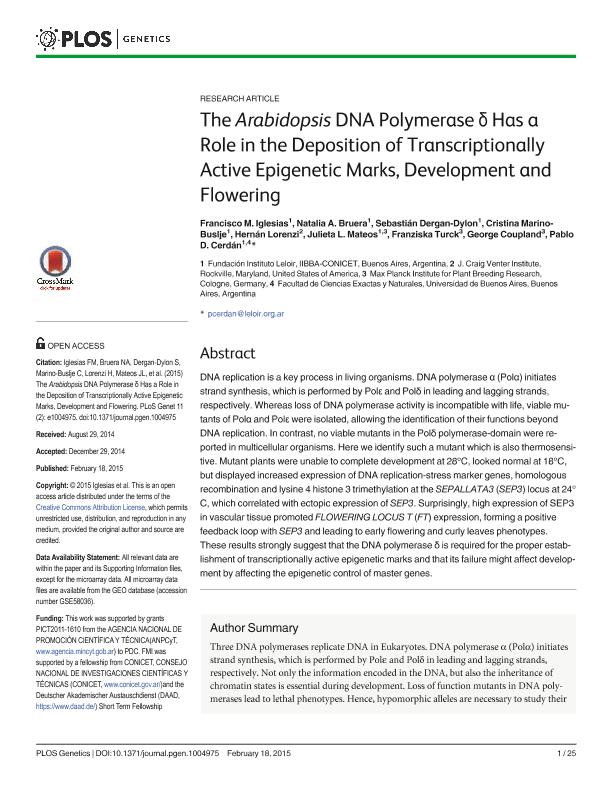Artículo
The arabidopsis DNA polymerase δ has a role in the deposition of transcriptionally active epigenetic marks, development and flowering
Iglesias, Francisco Manuel ; Bruera, Natalia Alejandra
; Bruera, Natalia Alejandra ; Dergan Dylon, Leonardo Sebastian
; Dergan Dylon, Leonardo Sebastian ; Marino, Cristina Ester
; Marino, Cristina Ester ; Lorenzi, Hernán; Mateos, Julieta Lisa
; Lorenzi, Hernán; Mateos, Julieta Lisa ; Turck, Franziska; Coupland, George; Cerdan, Pablo Diego
; Turck, Franziska; Coupland, George; Cerdan, Pablo Diego
 ; Bruera, Natalia Alejandra
; Bruera, Natalia Alejandra ; Dergan Dylon, Leonardo Sebastian
; Dergan Dylon, Leonardo Sebastian ; Marino, Cristina Ester
; Marino, Cristina Ester ; Lorenzi, Hernán; Mateos, Julieta Lisa
; Lorenzi, Hernán; Mateos, Julieta Lisa ; Turck, Franziska; Coupland, George; Cerdan, Pablo Diego
; Turck, Franziska; Coupland, George; Cerdan, Pablo Diego
Fecha de publicación:
02/2015
Editorial:
Public Library Of Science
Revista:
Plos Genetics
ISSN:
1553-7390
Idioma:
Inglés
Tipo de recurso:
Artículo publicado
Clasificación temática:
Resumen
DNA replication is a key process in living organisms. DNA polymerase α (Polα) initiates strand synthesis, which is performed by Polε and Polδ in leading and lagging strands, respectively. Whereas loss of DNA polymerase activity is incompatible with life, viable mutants of Polα and Polε were isolated, allowing the identification of their functions beyond DNA replication. In contrast, no viable mutants in the Polδ polymerase-domain were reported in multicellular organisms. Here we identify such a mutant which is also thermosensitive. Mutant plants were unable to complete development at 28°C, looked normal at 18°C, but displayed increased expression of DNA replication-stress marker genes, homologous recombination and lysine 4 histone 3 trimethylation at the SEPALLATA3 (SEP3) locus at 24°C, which correlated with ectopic expression of SEP3. Surprisingly, high expression of SEP3 in vascular tissue promoted FLOWERING LOCUS T (FT) expression, forming a positive feedback loop with SEP3 and leading to early flowering and curly leaves phenotypes. These results strongly suggest that the DNA polymerase δ is required for the proper establishment of transcriptionally active epigenetic marks and that its failure might affect development by affecting the epigenetic control of master genes.
Palabras clave:
Dna Replication
,
Epigenetics
,
Dna Polymersase
Archivos asociados
Licencia
Identificadores
Colecciones
Articulos(IIBBA)
Articulos de INST.DE INVEST.BIOQUIMICAS DE BS.AS(I)
Articulos de INST.DE INVEST.BIOQUIMICAS DE BS.AS(I)
Citación
Iglesias, Francisco Manuel; Bruera, Natalia Alejandra; Dergan Dylon, Leonardo Sebastian; Marino, Cristina Ester; Lorenzi, Hernán; et al.; The arabidopsis DNA polymerase δ has a role in the deposition of transcriptionally active epigenetic marks, development and flowering; Public Library Of Science; Plos Genetics; 11; 2; 2-2015; e1004975
Compartir
Altmétricas



